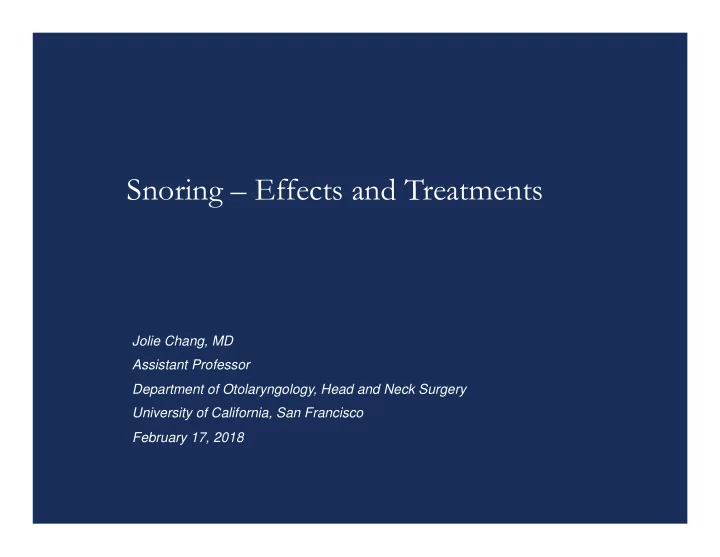

Snoring – Effects and Treatments Jolie Chang, MD Assistant Professor Department of Otolaryngology, Head and Neck Surgery University of California, San Francisco February 17, 2018
Disclosures � None
Outline � Snoring definition � Snoring Impact � Evaluation � Treatment � Outcomes
Snoring and Sleep � Chronic habitual snoring • 20% women; 40% men • Most common symptom of OSA (occurring in 70-95%) � OSA • AHI >5 + excessive daytime sleepiness � Primary snoring • AHI <5; no daytime symptoms � Snoring risk factors • Age, sex, obesity, ETOH or sedative use, smoking, nasal obstruction, asthma, COPD.
Snoring - Acoustics � Snoring = noise generated when air flows though a narrowed upper airway � Sound source: oscillation of soft palate >> pharyngeal walls, epiglottis, tongue � Atonia of upper airway -> narrowing/increased resistance-> turbulent airflow-> vibration of pharyngeal tissues Pevernagie et al. Sleep Med Rev. 2010.
Measuring Snoring � Most studies depend on self-report � Snoring evaluation measures • No agreed standard • Subjective: bed partner report, self-report (VAS) • Objective: ‒ microphone, airflow, vibrations ‒ amplitude, frequency, duration, timing � Studying clinical effects: • Snoring intensity? Sound frequency? Time spent snoring?
Effects of primary snoring
Social Impact � Bed partner • Impaired sleep quality • Relationship disharmony � Second-hand snoring • Once treated, partner QOL increased, sleepiness scores improved (Parish & Lyng. Chest 2003)
Snoring and Sleepiness � Sleep Heart Health Cohort Study � 6000 self-reported snoring and ESS � ESS increases with snoring frequency and loudness Gottlieb et al. Am J Respir Crit Care Med. 2000.
Snoring and Carotid disease � SLEEP 2008. � 110 Subjects; Cross-sectional study • PSG, snoring, carotid + femoral artery doppler U/S Severe snoring (>50% sleep • time) is associated with carotid – but not femoral- atherosclerosis • AHI was not associated with CA after adjusting for snoring severity. • Adjusted for AHI - Did not examine primary snorers
Mechanism of atherosclerosis Rabbit model � Right common carotid exposed to 6 hours of vibration � Endothelial dysfunction: Reduced vasorelaxation � Vibration induced vascular injury Cho et al. Sleep. 2011
Snoring and CV events • Prospective cohort study with 10 year followup • 377 snorers; 264 non-snorers; AHI<5 • Self-reported snoring confirmed by close relative, no excessive daytime sleepiness • No increased risk of fatal or nonfatal CV events in primary snorers without OSA. Marin et al. Lancet. 2005.
Evaluation of Snoring � Screen for OSA � Sleepiness, daytime symptoms � Bed partner – Separate rooms � Patient expectations � Exam • BMI • Nose • Palate/Oropharynx • Mandible • Neck
Snoring Intensity and OSA • 1600 Habitual snorers – PSG and objective measures • Significant correlation between loudness of snoring and AHI – AHI < 5 46dB – AHI >50 60dB Maimon & Hanly. J Clin Sleep Med 2010.
Snoring Treatment � Amazon.com ~800+ products � Treatment Goals � Treatment Types: • Behavior Modification • Devices • Surgery
Snore Aids � Michaelson and Mair. OtoHNS 2004. � Prospective randomized trial • Oral lubricant spray • Breathe right strips • Snore-no-more pillow � No objective or subjective difference
Behavioral Modification � Position � Weight Loss � Avoid alcohol, sedatives � Singing/Exercises
Exercises for Snoring � Ieto et al. Chest 2015. � 39 patients randomized: Nasal strips plus 1. Respiratory exercises (control) 2. Oropharyngeal exercises (8 minutes TID) � Decreased snoring frequency by 36%; Snore index 99.5 to 48.2
Devices – MAD and Theravent
Surgical Approaches � Nasal � Tonsils � Palate � Tongue
Treating Nasal Obstruction � Trial with nasal steroid spray x 3 weeks � Breathe-right strips � Allergy and sinus management � Surgery – Septoplasty, turbinate reduction, NSR � Medical or surgical treatment • Improves quality of life • Reduces mouth breathing • Variable results on snoring
Palate Stiffening � Injection Snoreplasty • 99% denatured alcohol • 3% sodium tetradecyl sulfate � Palate Radiofrequency • 1-3 treatments � CAPSO – Cautery Assisted Palatal Stiffening • Pang OtoHNS 2007: remove mucosa Subjective improvement at 3 months � Pillar Implants • 3-5 in muscular layer of soft palate • Extrusion in up to 11%
Pillar vs. RF (one treatment) � RCT single session implant vs RF treatment (14 per group) � 3-month VAS improved in both: implant group better � Objective snore maximal loudness reduced in implant group � Snoring index reduced in RF group Lee et al. PLOS one 2014.
Pillar Implants – Long Term � Rotenberg and Luu. Laryngoscope 2012. � Prospective cohort: 23 snorers, AHI < 15 � At 1 year: 95% would recommend; � At 4 years: only 22% would recommend 9.5 5.5 7.0
Palate Reduction � UPPP, UPF � LAUP – Laser Assisted Uvulopalatoplasty • 1-3 treatments to reshape the soft palate • Can reduce tonsil size • Laser: CO2, KTP, Argon, (electrocautery) � Comparison of UPPP vs. LAUP 1-4 years. (Prasad 2003) – 60 patients, bed-partner queried
Palate Suture Techniques Suture Technique TranQuill Sling Kwon et al. Eur Arch Otorhinolaryngol 2015. Murphey et al. Laryngoscope 2015.
Comparisons � Measures of snoring: subjective vs. objective • Often results don’t match � Most treatments have demonstrated improvement in subjective scores at 6-12 months post-procedure (short term) � Long-term relapse rate is high
Treatment Comparisons � Terryn et al. Oto HNS 2015. � 200 pts treated with CPAP, MAD, or surgery (various). � AHI < 20
Conclusions � Snoring is prevalent and has significant impact on the patient and the bed partner � Evaluation should rule out OSA � Snoring interventions can improve snoring with varying success. Defining goals of treatment is essential � More work is needed to define health effects of snoring and changes with treatment
Recommend
More recommend